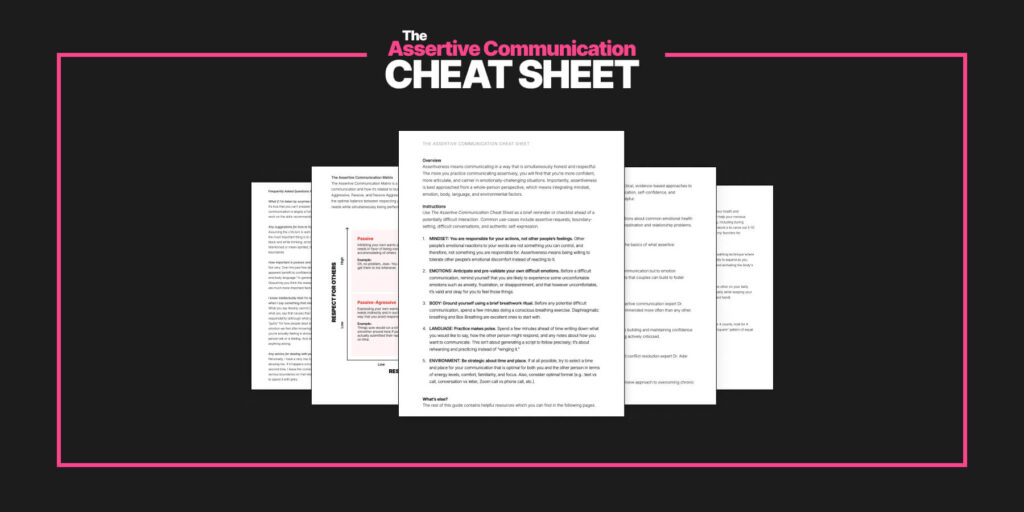🎯 What Are Healthy Boundaries?
Setting healthy boundaries means you’re able to say no to other people’s requests of you, especially when the requests would conflict with your values. Good boundaries are the cornerstone of healthy relationships, both with other people and yourself.
👀 Examples of Boundary Setting
- Saying no to your partner’s request that you go to a party with them over the weekend—despite being afraid that they’ll get angry—because you need time to recharge after an exhausting week of work.
- You’re planning to take your kids hiking on Saturday, but your boss emails you asking if you can come into work Saturday to help with a special project. Because you’re afraid to disappoint your boss, you’re tempted to go in; but in the end, you enforce your boundary of no work on the weekends, tell your boss you are not coming in, and go hiking as planned.
- Telling your mother-in-law that, actually, today is not a good day to drop by.
- Not checking email or social media before bed in order to protect your wind down time and improve your sleep.
- Saying no to hosting the extended family Christmas party this year because you and your family are going on vacation the following week and you don’t want to be stressed out and exhausted for that trip.
😬 Problems Associated with Poor Boundaries
- Relationship problems. When you habitually ignore your own wants and needs in order to go along with what other people want, resentment builds and builds, eventually leading to loss of trust, low intimacy, frequent conflict, and many other relationship problems.
- Anxiety and chronic worry. Poor boundaries—and low assertiveness generally—is one of the biggest causes of chronic worry and anxiety that most people don’t realize.
- Stress and burnout. The inability to say no to other people’s requests is a fast track to becoming chronically overwhelmed and stressed out. And the problem only compounds… As you become known as someone who always says yes, people naturally make more and more requests of you leading to a vicious cycle of chronic stress, and eventually, burnout.
- Low self-esteem. Would you admire someone who never stands up for themselves, never protects their time, or constantly puts off their own legitimate wants and needs in order to pacify other people? Of course not. It’s hard to feel good about yourself if you never stand up for yourself.
- People-pleasing and codependency. When you have a hard time saying no, it often stems from a fear of other people feeling disappointed in you. Well, the more you avoid saying no and setting healthy boundaries, the more you reinforce the belief that you are responsible for keeping other people happy, which makes it even harder to set good boundaries—another vicious cycle.
💡 Key Insights About Healthy Boundaries
- Boundaries are difficult because of the difficult emotions that go along with them. The key to setting (and enforcing) healthy boundaries is being able to manage all the difficult emotions that go with them. For example, if you can’t tolerate someone else feeling angry at you for saying no to their request, you’re going to have a hard time setting good boundaries. Boundary setting is less about communication than most people think and much more about emotional resilience.
- Healthy boundaries are primarily about you and your behavior, not other people’s behavior. Setting good boundaries is about identifying how you will behave in the face of other people’s requests or bad behavior. It’s easy to forget, but you have no control over what other people do—all you can control is your behavior.
- Every “no” is a “yes” to something else. Boundary setting can feel like an overly-negative thing—a whole lot of saying no. But remember: the reason you’re saying no to something is so you can say yes to something else. For example: You’re saying no to hosting that birthday party because you’re saying yes to self-care.
🛠️ Tips and Tools for Setting Healthy Boundaries
- Never set a boundary you’re not willing to enforce. Setting boundaries is hard. Enforcing them is even harder. But if you set boundaries and then fail to enforce them, you’re training people not to respect your boundaries, which only makes your job harder in the long-run. So think carefully before setting a boundary… Is this a boundary I am ready and willing to enforce if/when it gets violated?
- Be hyper-specific with your boundaries. Boundaries should be about behavior—not feelings, beliefs, expectations, wishes, dreams, etc. When you set a boundary it should be perfectly clear what the behavior you’re not okay with is and what your response to that will be if/when it happens. For example: You can’t set a boundary on anger, but you can set one on people yelling at you; you can’t set a boundary on your partner “not caring,” but you can set one on them watching TV instead of helping out around the house.
- Clarify the values behind your boundaries. Setting and enforcing healthy boundaries can be challenging, which means you’ll need all the motivation you can muster. And one of the best ways to boost your motivation for anything—including setting healthy boundaries—is to clarify your values. The clearer you are about why this boundary really matters to you, the more motivation and determination you will have to set it and enforce it.
📝 The Assertive Communication Cheat Sheet

The Assertive Communication Cheat Sheet is a free 5-page PDF guide I put together that summarizes my favorite tips for communicating assertively, plus answers to common questions, and extra resources and tools.
